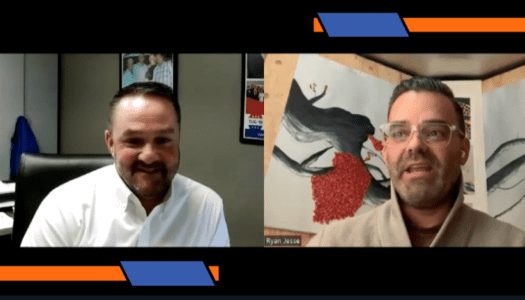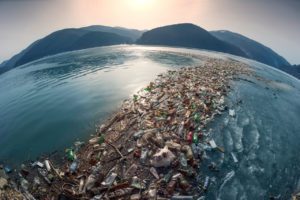
Share
Most people believe plastic is the worst offender when it comes to packaging materials that pollute — from its petroleum origins to its longevity in the environment.
But that’s changing, and one company leading the way is Change Plastic for Good. It’s a company that produces a polymer additive, BDP®, that can be added to accelerate their biodegradability. Founded in 2016, the company now boasts an impressive brand ally resume, including Mercedes-Benz, Levi’s, and Avery Dennison.
We sat down with founder and CEO Ryan Jesse to learn more about the technology and how it’s changing the plastics industry. Watch the video below for the full interview, or read a summarized transcript below.
Exclusive Interview: Ryan Jesse, Change Plastic for Good
Jeff Knapke, Versa Pak sales manager: Tell me a little bit about your background. What led you to found Change Plastic for Good?
Ryan Jesse: I’m a bit of a serial entrepreneur. In about 2016, I was looking for sustainable packaging before that was even a word, really. Nobody cared about plastic waste all that much at that point.
I found that there was nothing out there. And then I came across a technology that I thought, okay, this is amazing. It was a biotechnology that found medical sutures in the body where the microbes would break down your suture so the surgeons didn’t have to come in and remove them. And they had converted this into an application for plastics that would generally end up in a landfill where these microbes are present in the same kind of environment. We went on the road and started talking to companies and applying this technology into plastics and packaging.
We realized pretty quickly that there was a lot more to the story. People didn’t understand what sustainability was. A lot of companies at the time didn’t see a need for it. And then, of course, A Plastic Ocean came out and then Blue Planet came out, and everyone started screaming about plastic waste. And so that’s really when we started to take off. We were early into the industry in sustainability and really thought that we had something here from a technology standpoint. Now we’ve built a whole brand story around changing plastic for good. Basically, it’s telling the truth in sustainability with no room for greenwashing and creating a brand around giving companies the truth where there are a lot of options out there.

Jeff: What is the shelf life of a product with BDP added?
Ryan: The shelf life is the same as if it wasn’t in there. It’s only when the plastic product escapes recycling and ends up in our environment that it attracts those microbes. In this environment, this is where these microbes are present — the bottom of the ocean, in streams and rivers and ditches and things that are underwater and under mucky environments.
It’s different from degradable technologies, which create microplastics when they break down. Plastic made with BDP is actually consumed by microbes.
Jeff: What other products besides blown film can BDP be added to?
Ryan: It’s compatible with almost every type of polymer — polycarbonates, PVC rubbers, polyester yarn. We were actually selling BDP PPE. It’s very versatile.
Jeff: There’s an article on your website that talks about the myth that plastics have a more negative environmental impact than any other material. Can you talk about that?
Ryan: If you’re looking at lifecycle analysis, plastic wins every time just based on the low carbon footprint of the production of plastic. A lot of people don’t realize that plastic is made from byproducts of oil. You’re pulling oil out of the ground regardless of whether we like that or not, so using its byproducts keeps the carbon footprint much lower than its paper, metal and glass counterparts..
Of course, paper has a high recyclability rate. I believe in the US it’s 68% of paper is recyclable. But then there’s coated paper, and coated paper can’t be recycled. So what typically ends up happening is you use a lot of energy to make paper. And then we typically use paper once, and then it gets landfilled. Now, in the landfill, what happens to paper, it rots just like food. So I think globally, according to the EPA, 10% of methane is produced from landfills, and out of landfill methane waste, almost 50% of that comes from paper.
Plastic is super lightweight and super strong, and so it requires much less area to move it, ship it and transport it. So if we were to go back to paper, glass and metal, how much fuel would we burn? How much CO2 would be blowing into our atmosphere? We have to calculate that factor and that’s why as a company, we are always looking at the overall ecological footprint.
Jeff: Where do you see the industry heading in terms of truly sustainable products? Do you think the general public cares about this enough? Does the responsibility for better sustainability rest on consumers or the industry?
Ryan: The consumers want sustainability. The youth of our generation are demanding it, right? Our job really is to focus on what is the right way forward. And so when you’re looking at sustainability in general, yes, I think there’s a desire for people to want to do the right thing, but the things that they’re cheering for are often the wrong thing. And I get frustrated. I’m like, companies are often not giving them the right way forward. Everyone’s giving them the profitable way forward for themselves, and so we see them making a lot of wrong decisions.
So, as I said earlier, we’re in a sustainability storm and there needs to be a lighthouse, right? Where it draws people to shore. And that’s what we’re trying to create. We’re trying to educate and guide people who are a little bit confused, especially companies.
Jeff: I don’t believe the marketing of plastics is good…think about when you go to the beach and see a bird with plastic wrapped around its neck. And do you think the government could be doing more to stop the pollution that is happening, a lot of times from other countries where disposal guidelines aren’t as stringent?
Ryan: It’s kind of a circle. America is the number one consumer, and so they go and place orders into China, where they manufacture product, which creates waste, and then they ship the goods back to America. America uses the product, unpackages it, throws it in the garbage, it goes to the landfill, it goes to the recycling center. China obviously used to accept a lot of plastic waste from foreign countries, including America. So we would ship our garbage back to China, and then in that cycle it ends up getting chucked into rivers and oceans. But then Americans say, well, it’s not us, right? It’s China and India and the 10 countries in Southeast Asia that are responsible, but really we’re all responsible as consumers.
You can’t put the blame on one person or the other. This is a system we’ve created. We’ve created a consumerist system that we’re all dependent on. And you can’t just reverse that completely and take away our products. Look at how angry people got when they got a paper straw instead of a plastic straw. People don’t like their luxuries taken away from them. So we have this system that we kind of all need to be responsible for. There’s no silver bullet solution. We have to monetize sustainability in a right way to solve the problem. If we can’t make money from plastic waste, then plastic waste is there to destroy our planet forever, right?
The only way to fix this system is either fix it at the core by using bio technologies like ours, and then finding a way to collect that waste back and convert it into something regenerative, or just to stop using and consuming, which we of course can’t do. So this is where as a company, we’re like, what can we do to convert all of these products into something that is good for the planet, not just mitigating it? We want to make it better.
Jeff: In 10 years, where do you think the plastics industry will be? Where do you think public policy and demand will be?
Ryan: There will be a lot of banning of plastics in the next 10 years, but production is actually up right now. Everything is plastic — my glasses, my shirt, my pants, my shoes.
So I don’t think the plastic industry is going anywhere, but I think everyone’s looking for solutions. And we feel we’re at the top of that. We’re in that network of people where we have real solutions. We’re calling out the fake ones, which is important because we have to shut down the ones that are just profiting off of it. And then I think in 10 years you’re going to see a clearer path towards true sustainability when it comes to all materials, not just plastics.
Learn more at Change Plastic for Good’s website or connect with Ryan on LinkedIn.
Sustainability at Versa Pak
At Versa Pak, we offer our customers the option of post-consumer resins, which are produced into sheeting, films, bags and more. As for sustainability efforts within our own Celina, Ohio, manufacturing plant, we also convert scrap from our projects back into resins to be re-used, and we’re now offering poly with BDP additives from Change Plastic for Good.
If you’d like to learn more about how this process can benefit you or to request a quote, contact us here.
